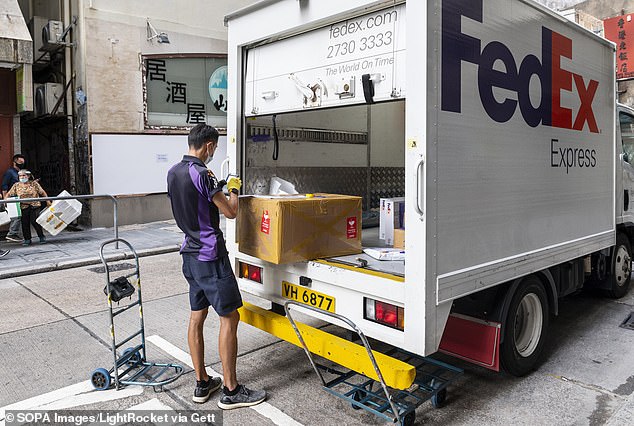FedEx is using AI-powered cameras on its trucks to assist with police investigations, a new report has revealed.
The popular postal company has partnered with a $4 billion Georgia-based surveillance startup called Flock Safety, Forbes reported.
Flock specializes in automatic license plate recognition and video surveillance, and already has a fleet of around 40,000 cameras spread across 4,000 cities in 40 states.
FedEx has partnered with the company to monitor its U.S. facilities, but under the agreement it also shares its Flock surveillance feeds with law enforcement. And it is believed to be one of four multi-billion-dollar private companies with this arrangement.
This has led critics to compare the move to the deployment of a mass surveillance network, as it emerged that some local police forces are also sharing their Flock feeds with FedEx.
Scroll down to watch the video:
FedEx is using AI-powered cameras installed on its trucks to assist in police investigations, a new Forbes report reveals.
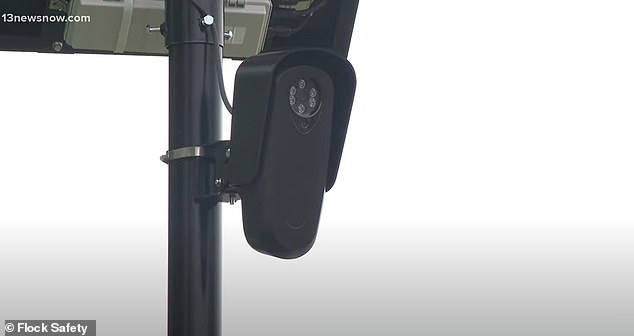
The popular postal company has partnered with Flock, a $4 billion surveillance startup from Georgia.
Jay Stanley, a policy analyst at the ACLU, told the Virginia Pilot: ‘There’s a simple principle that we’ve always had in this country, which is that the government can’t watch everyone all the time in case someone commits a crime.’
“America is not China,” he continued. “But these cameras are being deployed so densely that it’s like they’re tracking everyone by GPS.”
In response to Forbes’ report that FedEx was part of Flock’s surveillance system, he told the outlet: “This raises questions about why a private company… would have privileged access to data normally only available to law enforcement.” order”.
He went on to call it “deeply disconcerting.”
Flock Safety cameras are It is used to track vehicles by their license plates, as well as by the make, model and color of their cars. Other identifying features, such as dents and even bumper stickers, are also checked.
Lisa Femia, a senior staff attorney at the Electronic Frontier Foundation, warned that FedEx’s involvement could be problematic because private companies are not subject to the same transparency laws as law enforcement.
This, he told Forbes, could “leave the public in the dark, while at the same time expanding a kind of mass surveillance network.”
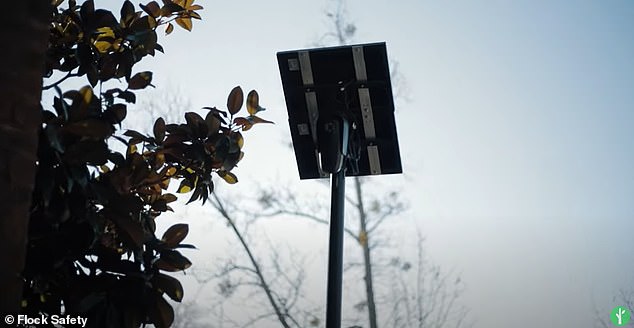
Flock uses real-time data “to enable and incentivize safer driving,” a description on its website says.
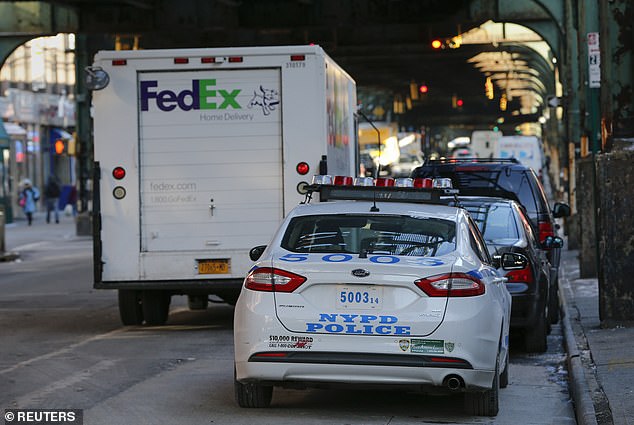
FedEx is believed to be one of four billion-dollar private companies partnering with Flock Safety
The Shelby County Sheriff’s Office in Tennessee confirmed its partnership with Flock in an email to Forbes.
“We share readings from our Flock license plate readers with FedEx in the same way we share data with other law enforcement agencies, locally, regionally and nationally,” public information officer John Morris told the outlet.
He also confirmed that his department had access to FedEx Flock feeds.
Its involvement was unmasked after Forbes found the force’s name on publicly available lists of data-sharing partners, along with others such as the Pittsboro Police Department in Indiana, located just outside Indianapolis.
Pittsboro Police Chief Scott King reportedly declined to comment on the reason for his department’s involvement but insisted the force had not requested access to a private system.
“Only those on the law enforcement list,” he said.

“The United States is not China,” ACLU policy analyst Jay Stanley told the Virginian Pilot newspaper. “But these cameras are being deployed so densely that it’s like they’re tracking everyone with a GPS.”

The Shelby County Sheriff’s Office in Tennessee confirmed the potentially problematic partnership with FedEx. Lt. David Ballars is seen flaunting Flock’s technology in a video posted on the company’s YouTube.
Greenwood Police Department Deputy Chief Matthew Fillenwarth confirmed that his force, also in Indiana, is participating in a similar manner.
The Memphis Police Department also stated that it had received camera footage from FedEx, but did not confirm whether it was provided by Flock.
Discussing license plate reader networks, Brett Max Kaufman, senior staff attorney at the American Civil Liberties Union (ACLU), said Forbes“The scale of this type of surveillance is incredibly huge.”
He went on to describe to the outlet how the warrantless tracking of citizens en masse was “pretty horrible.”
FedEx declined to answer questions about its partnership with Flock, saying in a statement: “We take the safety of our team members very seriously. That’s why we do not publicly comment on our safety procedures.”
There is no suggestion that the association is illegal, but some critics suggest it violates basic principles of the Constitution.
For now, it’s unclear how broad the agreement between law enforcement and FedEx really is or how much Flock data is being shared.
Forbes also found that FedEx wasn’t the only one making the decision to sign up: Kaiser Permanente, the largest health insurer in the U.S., was also involved.
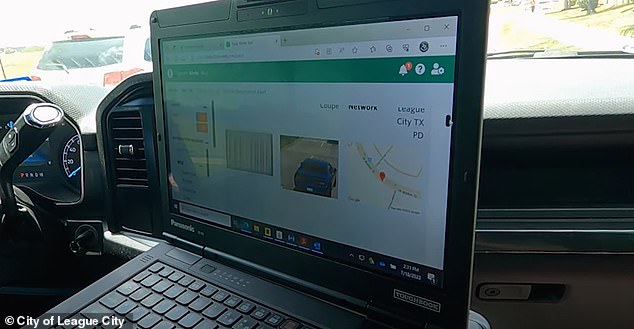
When asked, FedEx declined to answer questions about the partnership, saying in a statement: “We take the safety of our team members very seriously.” As such, we do not publicly discuss our safety procedures. Here you see the Flock interface being used by police officers in Tennessee.
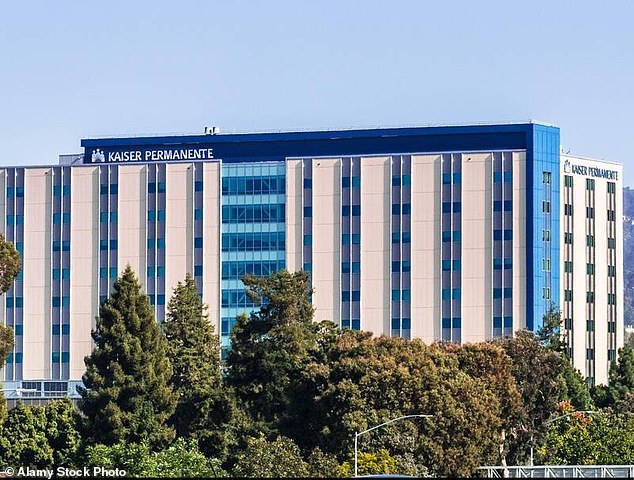
Kaiser Permanente Medical Center in the East Bay Area of San Francisco. The healthcare company was also exposed as a company that currently provides Flock camera data to police.
The company shared data obtained from the Flock cameras with the Northern California Regional Intelligence Center, an intelligence center that supports local and federal law enforcement investigations involving major crimes on California’s West Coast.
“As part of our robust safety programs, license plate readers are not only an effective visual deterrent, but the technology has allowed us to collaborate with law enforcement within the parameters of the law,” a spokesperson confirmed.
‘The technology has been used in response to court orders and subpoenas, as well as in other scenarios involving potential or ongoing crimes at the facility, and has supported the arrest and prosecution of those who commit crimes.’
The cameras were labeled so passersby could know they were filming, but she declined to comment when asked where the company had these cameras installed.
Meanwhile, police forces around the world continue to choose Flock as a partner in recent years, with more than 1,800 law enforcement agencies participating in it.
In total, more than 3,000 American communities use Flock’s technology, just ten years after the startup emerged in 2014.
The company is currently valued at nearly $4 billion and continues to receive a steady flow of venture capital.
In 2022, it raised a staggering $300 million in just seven months, followed by $38 million in Series B funding in February of the following year.
It uses real-time data “to enable and incentivize safer driving,” states a description on its website, which describes the effort as “the world’s first fully digital insurance company for connected and autonomous commercial vehicles.”
“Eliminate crime in your community,” says one chyron aimed at private sector businesses, such as grocery stores.


